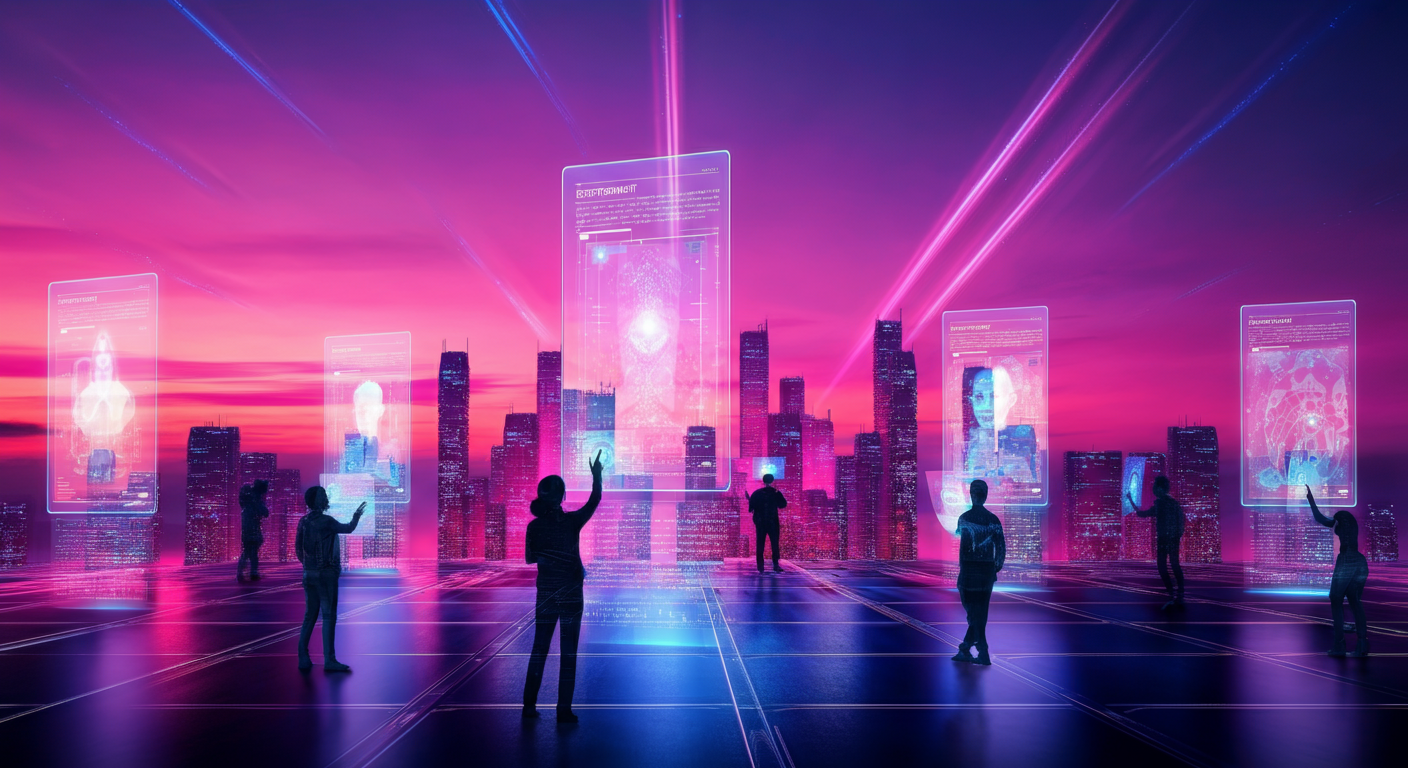In today’s ever-evolving landscape, innovations in entertainment technology are reshaping how businesses engage with their customers. From the bustling casinos of Las Vegas to the cozy corners of your neighborhood bar, these advancements are redefining customer experiences and setting new standards for commercial video solutions. But what exactly are these innovations, and why should you, as a business owner, pay attention?
Imagine stepping into a world where your favorite restaurant offers a personalized viewing experience, seamlessly integrating the latest sports events with tailored advertisements that resonate with your interests. This is not a distant future but a reality made possible by cutting-edge technology. Businesses in the hospitality and entertainment sectors are now leveraging these advancements to enhance customer satisfaction and drive engagement.
At DLM Media, we understand the transformative power of these technologies. As a leader in providing commercial video programming solutions, we are committed to helping businesses harness these innovations to create unforgettable experiences. Whether you’re managing a multi-location restaurant chain or looking to elevate the atmosphere in your casino, our expertise ensures you stay ahead of the curve.
In this blog post, we’ll dive deep into the latest trends and innovations in commercial video solutions. You’ll discover how these technologies impact various industries and learn practical tips for choosing the right provider for your needs. Get ready to explore the future of entertainment and discover how your business can benefit from these groundbreaking developments.
Emerging Trends in Entertainment Technology
The entertainment industry is undergoing a transformative phase, driven by groundbreaking innovations in technology. From artificial intelligence (AI) to virtual reality (VR) and cloud-based solutions, these advancements are reshaping how businesses engage with their audiences. As companies strive to enhance customer experiences, understanding these trends becomes crucial.
AI and VR have emerged as pivotal tools in the entertainment sector. AI is revolutionizing content creation and personalization, enabling businesses to deliver tailored experiences. Meanwhile, VR is offering immersive environments that captivate audiences, providing new avenues for engagement. These technologies are not just enhancing entertainment but are also redefining the business models within the industry.
AI in Entertainment
Artificial intelligence is playing a significant role in transforming entertainment. Companies are leveraging AI to analyze vast datasets, providing insights into consumer preferences and behaviors. This allows for highly personalized content recommendations, enhancing viewer satisfaction and engagement.
Moreover, AI is streamlining production processes. For instance, AI-driven tools can automate video editing, enabling faster and more efficient content creation. This not only reduces costs but also allows creators to focus on storytelling and creativity. As AI continues to evolve, its applications in entertainment will expand, offering even more innovative solutions.
Virtual Reality: A New Dimension
Virtual reality is revolutionizing the way audiences experience entertainment. By creating immersive environments, VR allows users to engage with content in unprecedented ways. From virtual concerts to interactive gaming, VR is opening up new possibilities for entertainment experiences.
Businesses are capitalizing on VR to create unique experiences that differentiate them from competitors. For example, VR can transport users to a virtual casino, offering an engaging and interactive environment that mimics real-world experiences. As VR technology advances, its potential to transform entertainment will only grow, providing businesses with exciting opportunities to captivate audiences.
The Rise of Cloud-Based Solutions
Cloud-based solutions are becoming increasingly important in the entertainment industry. They offer scalability, flexibility, and cost-effectiveness, making them an attractive option for businesses looking to enhance their operations.
By leveraging cloud technology, companies can store and manage vast amounts of data, enabling seamless content delivery across multiple platforms. This ensures that audiences have access to high-quality content anytime, anywhere. Additionally, cloud solutions facilitate collaboration and innovation, allowing businesses to adapt quickly to changing market demands.
In conclusion, the integration of AI, VR, and cloud-based solutions is redefining the entertainment landscape. As these technologies continue to evolve, businesses must stay informed and adapt to remain competitive. By embracing these innovations, companies can enhance customer experiences and drive growth in the ever-changing entertainment industry.
Impact of Technology on Customer Experience
The rapid advancement of technology is reshaping customer experiences in the entertainment industry. Businesses are leveraging these innovations to enhance satisfaction and loyalty, creating a more engaging atmosphere for their patrons. From personalized content delivery to interactive environments, technology is at the forefront of transforming how customers interact with entertainment services.
In today’s competitive landscape, understanding and implementing the latest innovations in entertainment technology can set businesses apart. By focusing on customer-centric solutions, companies can not only meet but exceed customer expectations, fostering a loyal customer base that returns time and again.
Personalization Through Data Analytics
Data analytics plays a crucial role in personalizing customer experiences. By analyzing customer preferences and behaviors, businesses can tailor their offerings to meet individual needs. This level of personalization is achieved through sophisticated algorithms that process vast amounts of data, providing insights into what customers want.
For instance, streaming services use data analytics to recommend content based on viewing history. This not only enhances the viewing experience but also increases customer engagement and retention. Businesses in the hospitality sector can similarly utilize data to customize entertainment options, ensuring that guests have access to content that resonates with them.
Interactive and Immersive Experiences
Interactive and immersive experiences are becoming increasingly popular in the entertainment industry. Technologies such as virtual reality (VR) and augmented reality (AR) offer customers a chance to engage with content in new and exciting ways. These technologies create an immersive environment that captivates audiences, providing a unique experience that traditional formats cannot match.
For example, VR can transport users to a virtual concert, allowing them to enjoy a live performance from the comfort of their home. Similarly, AR can enhance live events by overlaying digital information onto the physical world, creating a dynamic and interactive experience. These innovations not only attract new customers but also keep existing ones engaged.
Seamless Integration of Technology
Seamless integration of technology is essential for enhancing customer experiences. Businesses must ensure that their technological solutions work harmoniously with existing systems to provide a smooth and enjoyable experience for customers. This involves adopting user-friendly interfaces and ensuring reliable connectivity across platforms.
For instance, integrating digital signage solutions in restaurants and bars can provide customers with real-time updates on events, promotions, and menu offerings. This not only enhances the customer experience but also drives sales by promoting relevant products and services. By seamlessly integrating technology, businesses can create a cohesive and engaging environment that meets the needs of their customers.
Future Innovations and Their Potential Impact
The entertainment industry stands on the brink of revolutionary change, driven by groundbreaking innovations in entertainment technology. As we look to the future, these advancements promise to reshape how businesses engage with their audiences, offering new opportunities and challenges. Understanding these trends is essential for businesses aiming to stay ahead in a rapidly evolving landscape.
From AI-driven content creation to immersive virtual experiences, the future holds exciting possibilities. Businesses in the hospitality and entertainment sectors, such as casinos, restaurants, and bars, must prepare to adapt and leverage these innovations to enhance customer experiences and drive engagement. Let’s explore some of the most promising future innovations and their potential impact on the industry.
AI and Machine Learning in Content Creation
Artificial intelligence and machine learning are set to revolutionize content creation and personalization. By analyzing vast datasets, AI can generate highly personalized content recommendations, enhancing viewer satisfaction and engagement. This technology is already being used by streaming services to tailor content to individual preferences, and its applications are expected to expand significantly.
Moreover, AI-driven tools can automate various aspects of content production, from video editing to scriptwriting. This not only reduces costs but also allows creators to focus on storytelling and creativity. As AI continues to evolve, businesses can expect even more sophisticated solutions that streamline production processes and enhance content quality.
Immersive Virtual and Augmented Reality Experiences
Virtual reality (VR) and augmented reality (AR) are poised to transform the way audiences experience entertainment. These technologies create immersive environments that captivate audiences, providing unique experiences that traditional formats cannot match. From virtual concerts to interactive gaming, VR and AR offer new avenues for engagement.
Businesses can capitalize on these technologies to differentiate themselves from competitors. For example, VR can transport users to a virtual casino, offering an engaging environment that mimics real-world experiences. As VR and AR technology advances, their potential to transform entertainment will only grow, providing exciting opportunities for businesses to captivate audiences.
The Role of Blockchain and NFTs
Blockchain technology and non-fungible tokens (NFTs) are emerging as powerful tools in the entertainment industry. NFTs enable the creation and sale of unique digital assets, offering new revenue streams for content creators. This technology is already being used in the art and music industries, and its applications in entertainment are expected to expand.
For businesses, NFTs offer opportunities to engage with audiences in innovative ways. By offering exclusive digital content or experiences, companies can build stronger connections with their customers. As blockchain technology continues to evolve, its impact on the entertainment industry will likely increase, providing new opportunities for growth and innovation.
Embracing the Future of Entertainment Technology
As we stand on the brink of a new era in entertainment, the rapid pace of innovations in entertainment technology promises to redefine how businesses engage with their audiences. From the integration of artificial intelligence and virtual reality to the emergence of cloud-based solutions, these advancements are not just enhancing customer experiences but are also transforming business models. The key takeaway for any business in the hospitality and entertainment sectors is clear: embracing these technologies is no longer optional but essential for staying competitive.
The impact of these innovations is profound. Artificial intelligence is streamlining content creation and personalization, allowing businesses to deliver tailored experiences that resonate with individual preferences. Virtual reality is opening new dimensions of engagement, offering immersive environments that captivate audiences. Meanwhile, cloud-based solutions provide the scalability and flexibility necessary to deliver high-quality content across multiple platforms. These technologies collectively enhance customer satisfaction, drive engagement, and ultimately, foster loyalty.
- Personalization: AI-driven insights enable businesses to tailor content and experiences, meeting the unique needs of each customer.
- Immersion: VR and AR technologies offer interactive and engaging experiences that set businesses apart from competitors.
- Scalability: Cloud solutions allow seamless content delivery, ensuring audiences enjoy uninterrupted access to entertainment.
Looking ahead, the future of entertainment is filled with exciting possibilities. As AI and machine learning evolve, we can expect even more sophisticated content creation and recommendation systems. Virtual and augmented reality will continue to push the boundaries of immersive experiences, while blockchain and NFTs open new avenues for content monetization and audience engagement. By keeping pace with these trends, businesses can create memorable experiences that not only attract but also retain customers.
At DLM Media, we are committed to helping businesses harness these innovations to enhance their customer experiences. We invite you to explore our solutions and see how we can help your business stay ahead in this rapidly changing landscape. Embrace the future of entertainment technology and transform your business today!





